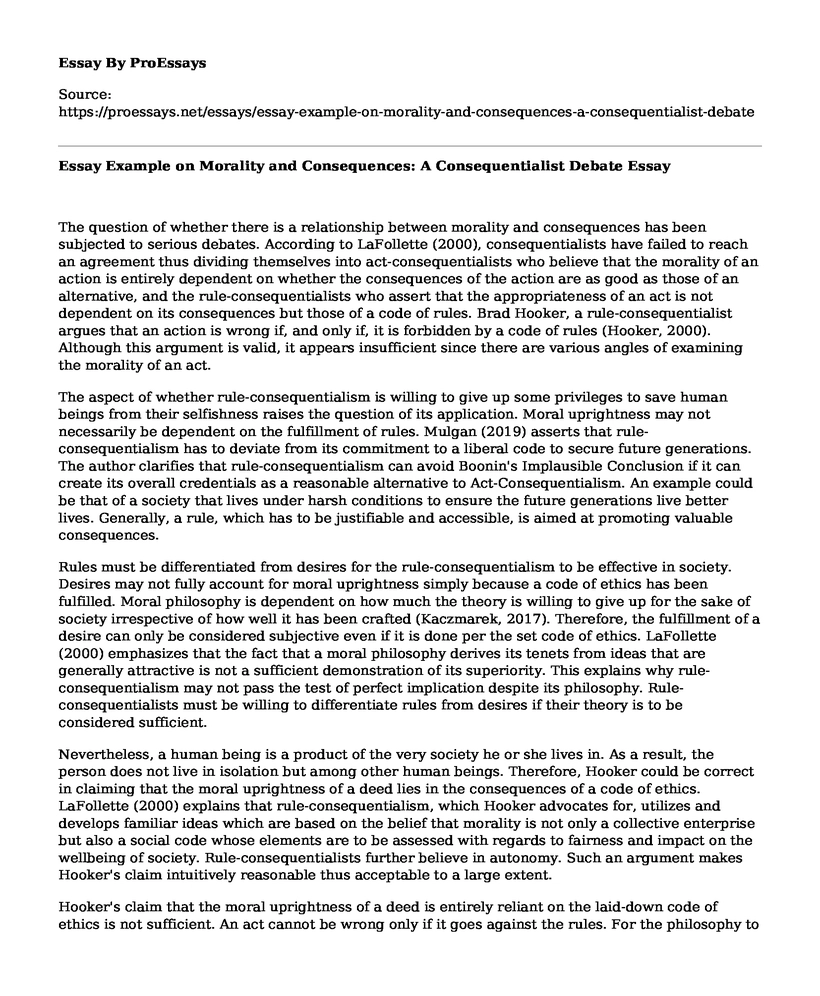The question of whether there is a relationship between morality and consequences has been subjected to serious debates. According to LaFollette (2000), consequentialists have failed to reach an agreement thus dividing themselves into act-consequentialists who believe that the morality of an action is entirely dependent on whether the consequences of the action are as good as those of an alternative, and the rule-consequentialists who assert that the appropriateness of an act is not dependent on its consequences but those of a code of rules. Brad Hooker, a rule-consequentialist argues that an action is wrong if, and only if, it is forbidden by a code of rules (Hooker, 2000). Although this argument is valid, it appears insufficient since there are various angles of examining the morality of an act.
The aspect of whether rule-consequentialism is willing to give up some privileges to save human beings from their selfishness raises the question of its application. Moral uprightness may not necessarily be dependent on the fulfillment of rules. Mulgan (2019) asserts that rule-consequentialism has to deviate from its commitment to a liberal code to secure future generations. The author clarifies that rule-consequentialism can avoid Boonin's Implausible Conclusion if it can create its overall credentials as a reasonable alternative to Act-Consequentialism. An example could be that of a society that lives under harsh conditions to ensure the future generations live better lives. Generally, a rule, which has to be justifiable and accessible, is aimed at promoting valuable consequences.
Rules must be differentiated from desires for the rule-consequentialism to be effective in society. Desires may not fully account for moral uprightness simply because a code of ethics has been fulfilled. Moral philosophy is dependent on how much the theory is willing to give up for the sake of society irrespective of how well it has been crafted (Kaczmarek, 2017). Therefore, the fulfillment of a desire can only be considered subjective even if it is done per the set code of ethics. LaFollette (2000) emphasizes that the fact that a moral philosophy derives its tenets from ideas that are generally attractive is not a sufficient demonstration of its superiority. This explains why rule-consequentialism may not pass the test of perfect implication despite its philosophy. Rule-consequentialists must be willing to differentiate rules from desires if their theory is to be considered sufficient.
Nevertheless, a human being is a product of the very society he or she lives in. As a result, the person does not live in isolation but among other human beings. Therefore, Hooker could be correct in claiming that the moral uprightness of a deed lies in the consequences of a code of ethics. LaFollette (2000) explains that rule-consequentialism, which Hooker advocates for, utilizes and develops familiar ideas which are based on the belief that morality is not only a collective enterprise but also a social code whose elements are to be assessed with regards to fairness and impact on the wellbeing of society. Rule-consequentialists further believe in autonomy. Such an argument makes Hooker's claim intuitively reasonable thus acceptable to a large extent.
Hooker's claim that the moral uprightness of a deed is entirely reliant on the laid-down code of ethics is not sufficient. An act cannot be wrong only if it goes against the rules. For the philosophy to be sufficient, it must not only be willing to give up some aspects and but should also differentiate desires from rules. This is despite the argument that rules are fair and effective in enhancing collective responsibility. Therefore, since an act may be wrong despite being within the rules, rule-consequentialism is insufficient in determining moral uprightness.
References
Hooker, B. (2000). Ideal code, real-world: A rule-consequentialist theory of morality. Oxford University Press.Kaczmarek, P. (2017). How much is rule-consequentialism willing to give up to save the future of humanity?. Utilitas, 29(2), 239-249.
LaFollette, H. (2000). The Blackwell guide to ethical theory. Blackwell Publishing Ltd.
Mulgan, T. (2019). how rule-consequentialism avoids Boonin's Implausible Conclusion. Law, Ethics and Philosophy, 7, 84-101.
Cite this page
Essay Example on Morality and Consequences: A Consequentialist Debate. (2023, May 08). Retrieved from https://proessays.net/essays/essay-example-on-morality-and-consequences-a-consequentialist-debate
If you are the original author of this essay and no longer wish to have it published on the ProEssays website, please click below to request its removal:
- Essay Sample: The Man Who Can Live Alone Is Either an Animal or a God
- Arguments in Favor of Objectivism and Subjectivism Essay
- Analysis of Ethics and the Fundamental Ethical Principles Applicable in Auditing
- Essay Example on Abortion: Thompson's Justifications and Objections
- Essay Sample on Ethical Relativism: A Subjective View of Moral Principles
- Essay Example on A Life Worth Living: Socrates' Theory of an Examined Life
- Irigaray's Ethics of Sex - Essay Example







